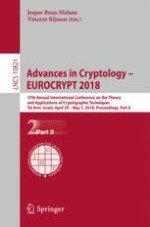2018 | OriginalPaper | Buchkapitel
The Discrete-Logarithm Problem with Preprocessing
verfasst von : Henry Corrigan-Gibbs, Dmitry Kogan
Erschienen in: Advances in Cryptology – EUROCRYPT 2018
Aktivieren Sie unsere intelligente Suche, um passende Fachinhalte oder Patente zu finden.
Wählen Sie Textabschnitte aus um mit Künstlicher Intelligenz passenden Patente zu finden. powered by
Markieren Sie Textabschnitte, um KI-gestützt weitere passende Inhalte zu finden. powered by
